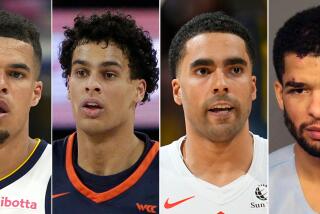The NBA / Sam McManis : Drew, a Three-Time Offender, Hopes to Return
- Share via
John Drew has been in and out of drug rehabilitation centers the last four years because of cocaine dependency. He was also arrested last spring in Salt Lake City for passing bad checks.
That resulted in a judge’s order for another hospital stay so that Drew could “get a positive outlook on life.”
Drew still believes that he should be allowed to make a living playing in the National Basketball Assn.
The NBA, which instituted a controversial drug policy two years ago, recently ruled that Drew will be banned from the league until at least the 1987-88 season, which may amount to a life sentence since Drew will be 33 when he’s eligible for reinstatement.
Drew, who scored 15,291 points before being waived by the Utah Jazz last season, is the first player personally affected by the NBA’s three-strikes-and-you’re-out policy.
The agreement, endorsed by the players’ union, allows players to receive treatment for drug addiction twice without significant penalty. A three-time offender, however, is thrown out of the league for at least two seasons.
In late December, the Washington Bullets expressed interest in signing Drew, currently averaging 25 points a game for the Wyoming Wildcatters of the Continental Basketball League. But league officials reviewed Drew’s record and determined that he did not warrant another chance.
Drew has declined all interview requests. But Tom Rasmussen, Drew’s Salt Lake City-based attorney, said he will decide this week whether Drew will challenge the league’s drug policy by claiming the NBA is denying Drew the right to earn a living.
“This is a very sensitive area, and we’re looking at all the options,” Rasmussen said. “We’re evaluating challenging (the rule) but I’ve yet to hear from (players’ union director) Larry Fleisher about whether we’d file for arbitration or a lawsuit.”
Drug abuse by professional athletes has been in the headlines again recently, and the result of a possible suit challenging the NBA’s rule might set precedent for other sports leagues seeking a uniform drug policy.
“John could be the guinea pig for all drug policies, and I’m not sure John wants the spotlight on him if it goes to court,” Rasmussen said. “It’s a potential barn-burner. Should a player whose drug problems are in the past be allowed to resume playing?”
Rasmussen assures that Drew’s problems are past. Since Drew’s arrest last May for passing bad checks and a subsequent stay in a Salt Lake City rehabilitation center, Rasmussen said Drew has remained clean.
Even though Drew has been hospitalized four times since 1982, Rasmussen says Drew is not a three-time offender according to the NBA’s policy.
Drew’s first stay, in November of 1982, occurred before the policy was in effect. That was followed by rehabilitation stays in June and December of 1984. Then came last May’s bad-check episode and a hospitalization at Highland Ridge Hospital in Salt Lake City in lieu of a sentence.
“(NBA General Counsel Gary Bettman) said Highland Ridge was Strike 3, even though (Drew) had been waived by the Jazz and wasn’t in the NBA,” Rasmussen said. “The judge said he sent him there to get a positive outlook on life, and that he was not in a downhill state.”
The question in the NBA’s mind is whether Drew was involved in drugs during the period in 1985 after he had been waived by the Jazz and before he was arrested for writing bad checks.
“Was he using the money for drugs? I don’t know,” Rasmussen said. “But he has been clean. . . . John was devastated when he first heard the ruling. But he’s still with the Wildcatters, still scoring a lot of points and holding up well, considering that this decision shattered his life. He’s hoping to get another chance.”
When long-time minority owner Jonathon Kovler sold his interest in the Chicago Bulls last week, he paused for some parting shots at majority owner Jerry Reinsdorf.
Among other things, Kovler said he had absolutely no confidence in Reinsdorf’s basketball judgment. “When I say that, I mean in terms of trades, draft picks and personnel changes,” Kovler said. “I can’t tell you if the team is headed in the right direction. We’ll have to wait and see. I have my own opinions.”
Reinsdorf could not be reached for his opinions.
Kovler, who sold his 6.5% of the Bulls to Reinsdorf, had the title of operating officer when the late Arthur Wirtz owned the team. He was most critical of Reinsdorf’s firing of Rod Thorn as general manager last spring, and replacing him with Jerry Krause.
“(Krause) hadn’t been in the league for years,” Kovler said. “And what has he done? Nothing.”
Kovler told a Chicago writer that, besides managing his family’s business, he wants to become a player agent.
That should be interesting if he has to deal with the Bulls.
Point guard Johnny Moore of the San Antonio Spurs attended his first game last Saturday night since he was hospitalized nearly a month ago with an unusual and debilitating form of meningitis known as desert fever.
Moore, who will miss the rest of this season and maybe even all of next season, wore a baseball cap to hide the scars from two operations performed to fight the fungus, which is indigenous to the southwestern United States.
Doctors said that 10% of the population in the Southwest is exposed to the fungus but that only one in a thousand of those gets meningitis.
Moore underwent surgery Jan. 15 to have a small plastic disc placed under his forehead. Then, a small hole was drilled through the skull and a tube was inserted through the brain, where the infection exists. Medicine is injected through the tube and, eventually, kills the fungus.
Moore, still experiencing severe headaches, first felt the effects of desert fever after a game Dec. 21 against the Clippers at the Sports Arena.
“When I woke up, it was like I had drunk a gallon of booze or something,” Moore told San Antonio writers. “When I found out what I was dealing with, well, I would have cried if I thought it would have done any good. It’s terrifying to hear the words life-threatening and know they are talking about you.”
Moore’s doctors say that the meningitis was caught in an early stage, so Moore may be able to resume playing basketball as soon as late next season.
More to Read
Go beyond the scoreboard
Get the latest on L.A.'s teams in the daily Sports Report newsletter.
You may occasionally receive promotional content from the Los Angeles Times.










